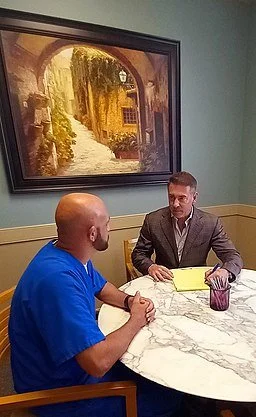The Attorney-Client Privilege
The American litigation system requires people to reveal a lot of information. Although there are some limits, a litigant may seek nearly any document and file you have and anything you can remember. This was burdensome before email and cell phones, and it’s even more burdensome now. But there is a major exception that permits people to speak openly without much fear that their statements will be subject to disclosure: the attorney-client privilege.
Why should you read this post about the attorney-client privilege?
You told your lawyer a secret and want to know how safe that secret is.
You need to know what parts of this post to redact before sharing it with an adversary.
It’s pretty short.
Image credit: https://commons.wikimedia.org/wiki/File:Attorney_meets_with_client_for_estate_planning.jpg
When Does the Privilege Apply?
The privilege applies only in a narrow situation: when a client seeks or receives legal advice from a lawyer outside of the presence of other people. So for example, if a client asks me a legal question in my office when we are alone, and I answer the question, both the question and the answer are privileged.
The privilege also extends to attorney work product. These are not communications between a client and attorney, but instead the notes and documents that an attorney prepares for a client. They may also include documents that a client prepares at the express direction of a lawyer.
Privileged documents and communications can take many forms. They could be words spoken aloud, emails, a Word document, a spreadsheet, or an audio file.
But there are many situations in which the privilege does not apply. Conversations between a client and an attorney that are not requests for or provisions of legal advice aren’t privileged. So, if a client asks me what I am having for dinner, and I tell her about a sushi restaurant I enjoy, that conversation is not protected by the privilege. The privilege also doesn’t protect documents that a client sends a lawyer that weren't privileged before the client sent them to the lawyer.
The privilege also does not apply when a non-lawyer is in the presence of the conversation. So if me and my client and the client’s friend are in a room, our discussions in the room are not privileged. Or if a client asks me for advice, but copies a friend on the email, the communication is not privileged. But not all privileged conversations are one-on-one. If I represent a company, the presence of any company employee may not break the privilege. And if a co-counsel or a client that is part of the same defense or an agent of the client or someone whose role is to help communications between the lawyer and client (such as a translator or an expert) is present, that may not break the privilege either.
Many people write “Attorney-Client Privileged” on documents and communications. But merely adding these words doesn’t make a document privileged, and the absence of those words does not affect whether the privilege applies. Still, it may be prudent to add these words so a recipient knows to keep the documents or communications confidential and to alert a distracted document reviewer to make sure to treat the document as privileged.
Asserting the Privilege
The privilege arises often in response to a request by another party for documents and communications.
When a party issues a document request, that request may describe privileged documents. Instead of providing a privileged document in connection with that request, the responding party can object on the grounds of the privilege and decline to produce the responsive document. But they generally have to provide notice of the objection and produce a log of the documents that are withheld pursuant to the privilege. These logs often state the sender, recipient, and other basic information about the withheld document. This information is useful if the parties have to litigate whether the privilege really applies.
Some documents contain both privileged and non-privileged information. For those documents, an attorney redacts out the privileged portion, and produces a redacted version of the document that reveals the non-privileged portion. The attorney discloses details about the privileged portion on the privilege log. Redactions are a big task in document review and document production.
Also, at depositions, an attorney may ask a question and the answer may involve privileged information. For example, a questioner may ask “Did anyone tell you to sign this document?” The answer may be that the witness’s lawyer told the witness to sign it. In that case, the witness’s lawyer may object to the question and instruct the witness not to answer it.
Waiving the Privilege
Just because the conditions exist for the privilege applying doesn’t mean it always applies. This is because a person can waive the privilege.
One common way for people to waive the privilege is by sharing a privileged communication with a third party. So, for example, if I send an email to a client with legal advice, that communication is privileged. But if my client forwards the email to a friend, the communication is no longer privileged and it is subject to disclosure.
Another common way to waive the privilege is to make the subject of a privileged communication be an issue in the lawsuit. For example, a recent New York State appellate case held that a party in litigation waived the privilege when one of its witnesses testified that he took an action because the company’s lawyer instructed him to do so. Since whether the circumstances of that communication were now relevant to the dispute, the party waived the privilege. In situations like this, lawyers say that the privilege cannot both be a sword and a shield, meaning that a party cannot use lawyer conversations to advance their case when they want but then also refuse to disclose them when they do not want to.
